
Victor Andrew de Bier Everleigh McLaglen was a British-American actor and boxer. His film career spanned from the early 1920s through the 1950s, initially as a leading man, though he was better known for his character acting. He was a well-known member of John Ford’s Stock Company, appearing in 12 of the director’s films, seven of which co-starred John Wayne.

The Informer is a 1935 American drama thriller film directed and produced by John Ford, adapted by Dudley Nichols from the 1925 novel of the same title by Irish novelist Liam O'Flaherty. Set in 1922, the plot concerns the underside of the Irish War of Independence and centers on a disgraced Republican man, played by Victor McLaglen, who anonymously informs on his former comrades and spirals into guilt as his treachery becomes known. Heather Angel, Preston Foster, Margot Grahame, Wallace Ford, Una O'Connor and J. M. Kerrigan co-star. The novel had previously been adapted for a British film of the same name in 1929.
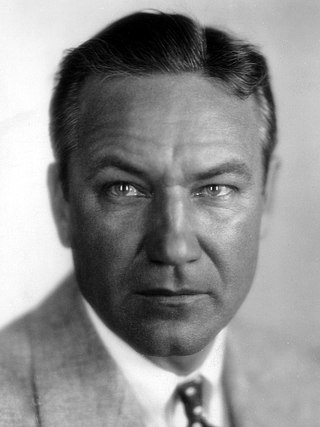
Victor Lonzo Fleming was an American film director, cinematographer, and producer. His most popular films were Gone with the Wind, for which he won an Academy Award for Best Director, and The Wizard of Oz. Fleming has those same two films listed in the top 10 of the American Film Institute's 2007 AFI's 100 Years...100 Movies list.

Ida Lupino was a British actress, director, writer, and producer. Throughout her 48-year career, she appeared in 59 films and directed eight, working primarily in the United States, where she became a citizen in 1948. She is widely regarded as the most prominent female filmmaker working in the 1950s during the Hollywood studio system. With her independent production company, she co-wrote and co-produced several social-message films and became the first woman to direct a film noir, The Hitch-Hiker, in 1953.

Raoul Walsh was an American film director, actor, founding member of the Academy of Motion Picture Arts and Sciences (AMPAS), and the brother of silent screen actor George Walsh. He was known for portraying John Wilkes Booth in the silent film The Birth of a Nation (1915) and for directing such films as the widescreen epic The Big Trail (1930) starring John Wayne in his first leading role, The Roaring Twenties starring James Cagney and Humphrey Bogart, High Sierra (1941) starring Ida Lupino and Humphrey Bogart, and White Heat (1949) starring James Cagney and Edmond O'Brien. He directed his last film in 1964. His work has been noted as influences on directors such as Rainer Werner Fassbinder, Jack Hill, and Martin Scorsese.
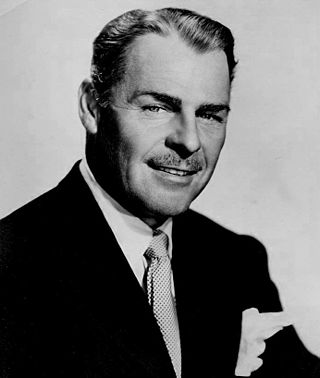
Waldo Brian Donlevy was an American actor, who was noted for playing dangerous and tough characters. Usually appearing in supporting roles, among his best-known films are Beau Geste (1939), The Great McGinty (1940) and Wake Island (1942). For his role as the sadistic Sergeant Markoff in Beau Geste, he was nominated for the Academy Award for Best Supporting Actor.
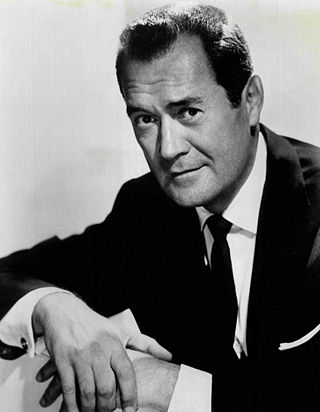
Frank Andrew Lovejoy Jr. was an American actor in radio, film, and television. He is perhaps best remembered for appearing in the film noir The Hitch-Hiker and for starring in the radio drama Night Beat.
Seawolf, Sea wolf or Sea Wolves may refer to:
Andrew Victor McLaglen was a British-born American film and television director, known for Westerns and adventure films, often starring John Wayne or James Stewart.
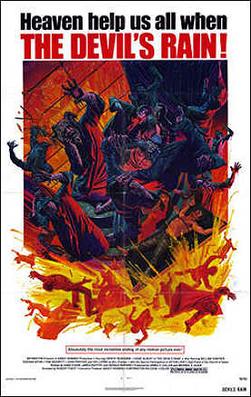
The Devil's Rain is a 1975 supernatural horror film directed by Robert Fuest. The ensemble cast includes William Shatner, Tom Skerritt, Ernest Borgnine, Eddie Albert, Ida Lupino and Keenan Wynn. John Travolta made his film debut in a minor role. During filming, Travolta converted to the Scientology religion after co-star Joan Prather gave him a copy of the book Dianetics written by Scientology founder L. Ron Hubbard. Satanist Anton LaVey is credited as the film's technical advisor and appeared in the film playing a minor role. Although it takes place in an unspecified part of the American Southwest, the movie was shot in Durango, Mexico.

Henry William George Lupino professionally Lupino Lane, was an English actor and theatre manager, and a member of the famous Lupino family, which eventually included his niece, the screenwriter/director/actress Ida Lupino. Lane started out as a child performer, known as 'Little Nipper', and went on to appear in a wide range of theatrical, music hall and film performances. Increasingly celebrated for his silent comedy short subjects, he is best known in the United Kingdom for playing Bill Snibson in the play and film Me and My Girl, which popularized the song and dance routine "The Lambeth Walk".
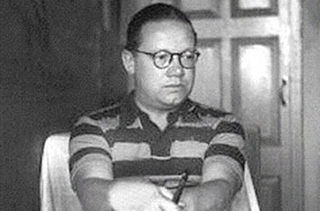
Garrett Elsden Fort was an American short story writer, playwright, and Hollywood screenwriter. He is mostly known for his connections with 1930s horror films, with film historian Gary Don Rhodes describing him as "one of, if not the pre-eminent horror film screenwriters of the classic era." He was a close follower of Meher Baba, and travelled to India while developing a screenplay based on Baba's philosophy.
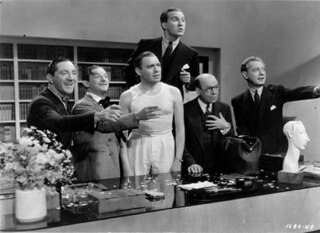
Artists and Models is a 1937 black-and-white American musical comedy film, directed by Raoul Walsh and starring Jack Benny and Ida Lupino. It was produced by Lewis E. Gensler.

Duke York, was an American film actor and stuntman who appeared in nearly 160 films between 1932 and 1952. He was also known as Duke Owl.
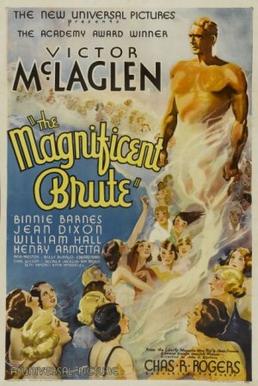
The Magnificent Brute is a 1936 American drama film directed by John G. Blystone and starring Victor McLaglen, Binnie Barnes and Jean Dixon. It was nominated for an Academy Award for Best Art Direction by Albert S. D'Agostino and Jack Otterson.
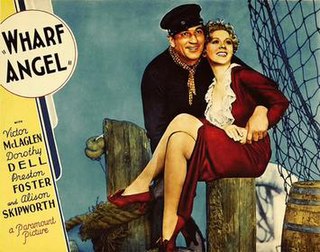
Wharf Angel is a 1934 American drama film directed by William Cameron Menzies and George Somnes and starring Victor McLaglen, Dorothy Dell, David Landau, and Preston Foster. Wharf Angel was the first screenplay of Stephen Morehouse Avery.

Call Out the Marines is a 1942 military comedy released by RKO in February 1942. It stars Victor McLaglen and Edmund Lowe playing the same characters with different names that they played in What Price Glory? and several sequels; however the original film trailer mentions What Price Glory? and The Cock-Eyed World. The film features extensive stock footage from RKO's Soldiers of the Sea that in some cases appear on process screens that the actors stand in front of.
Roger Touhy, Gangster is a 1944 American gangster film based on the life of Chicago mob figure Roger Touhy, directed by film noir specialist Robert Florey.
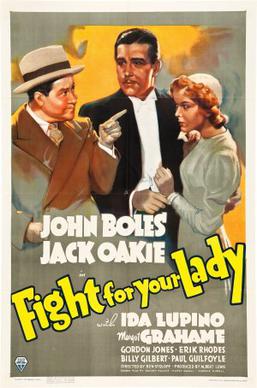
Fight for Your Lady is a 1937 American comedy film directed by Benjamin Stoloff and written by Ernest Pagano, Harry Segall and Harold Daniel Kusel. The film stars John Boles, Jack Oakie, Ida Lupino, Margot Grahame, Gordon Jones, Erik Rhodes, Billy Gilbert and Paul Guilfoyle. The film was released on November 5, 1937, by RKO Pictures.
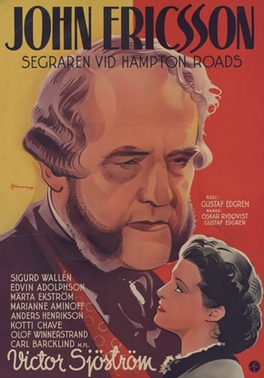
John Ericsson, Victor of Hampton Roads is a 1937 Swedish historical drama film directed by Gustaf Edgren and starring Victor Sjöström, Märta Ekström and Anders Henrikson. It is a biographical film of the nineteenth century Swedish engineer and inventor John Ericsson, known for his work in Britain and the United States. The title refers to the 1862 Battle of Hampton Roads in the American Civil War, which featured the warship USS Monitor designed by Ericsson.

















